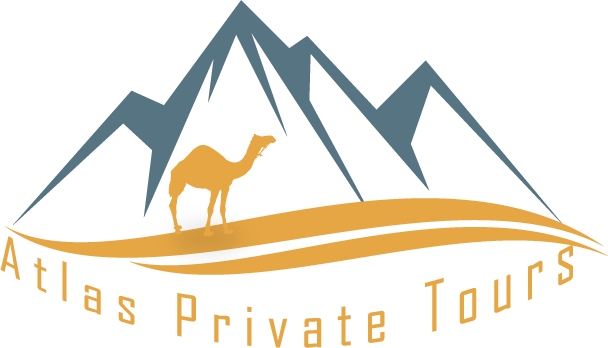Is Morocco Safe for Solo Travelers? Tips and Honest Advice
Introduction
Morocco is a land of contrasts bustling ancient medinas, stunning deserts, snow-capped mountains, and serene coastal towns. It’s a country where tradition and modernity coexist, offering travelers an unforgettable cultural experience. From the vibrant souks of Marrakech to the calm blue alleys of Chefchaouen, Morocco attracts millions of tourists each year looking for adventure, history, and hospitality.
But for solo travelers especially those coming from outside North Africa or the Middle East the question often arises: Is Morocco safe to explore alone?
With stories ranging from magical discoveries to uncomfortable street experiences, the truth lies somewhere in between. Like any destination, Morocco has its strengths and challenges when it comes to solo travel. The key is being informed, prepared, and respectful of the culture.
In this article, we’ll give you honest advice, practical safety tips, and a clear picture of what to expect if you plan to travel solo in Morocco whether you’re male or female, a first-timer or a seasoned traveler.
Is Morocco Safe for Solo Travelers?
In general, Morocco is considered safe for solo travelers, and millions of tourists visit each year without incident. The country relies heavily on tourism, and authorities take safety in major cities and tourist zones seriously. Police presence is visible, especially in places like Marrakech, Fes, and Casablanca, and there are even special branches of tourist police available to help foreigners.
That said, like many travel destinations, Morocco comes with its own set of challenges especially for solo travelers unfamiliar with the local culture and street dynamics. Most issues are minor and can be avoided with basic awareness. These might include persistent street vendors, mild scams, or pickpocketing in crowded areas. Violent crime against tourists is extremely rare.
One of Morocco’s biggest strengths is its welcoming culture. Hospitality is deeply rooted in Moroccan traditions, and locals often go out of their way to assist travelers especially if you’re respectful and show an interest in their culture. However, not every interaction is purely friendly some may be profit-motivated, especially in tourist-heavy areas.
So, is Morocco safe for solo travelers?
Yes, with the right mindset, preparation, and awareness, solo travel in Morocco can be rewarding and enriching, not risky.
Experiences by Type of Traveler
a. Solo Female Travelers
Traveling alone as a woman in Morocco can be an empowering and eye-opening experience but it does come with some unique challenges. Many solo females travelers report being approached frequently by men, receiving unwanted comments, or being offered unsolicited “guidance” in tourist areas. While most of this attention is verbal and non-threatening, it can feel overwhelming at times.
Tips for Solo Women:
- Dress modestly .
- Say “La, shukran” (No, thank you) firmly and move on.
Despite some cultural discomforts, many female travelers describe Morocco as one of the most memorable trips they’ve taken especially once they adjust to the rhythm of the country and find supportive locals.
Real Experience : Navigating Morocco with Confidence
In “Exploring Morocco as a Solo Female Traveller”, the traveler documents her experiences across different Moroccan cities. She discusses safety, cultural interactions, and the empowerment that comes from solo travel. Her candid storytelling provides valuable advice for women considering a solo trip to Morocco.
Discover the full story: Exploring Morocco as a Solo Female Traveller
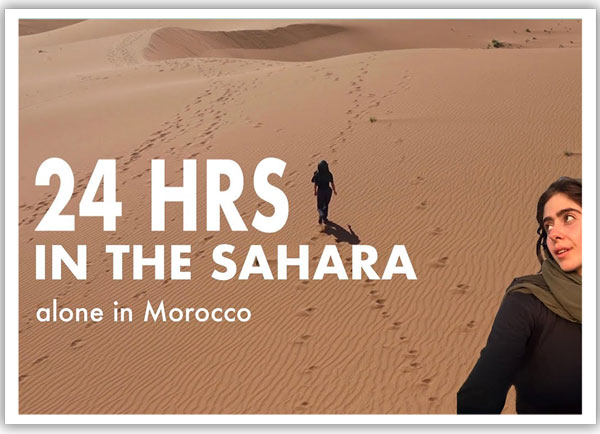
b. Solo Male Travelers
Solo male travelers generally face fewer safety concerns and are less likely to experience harassment, but that doesn’t mean the experience is completely hassle-free. Many reports being approached by “fake guides” or being pressured to enter shops.
Tips for Solo Men:
- Be cautious of overly friendly strangers offering help without being asked.
- Avoid showing large amounts of money or valuable tech openly.
- Learn a few polite Arabic or French phrases to show respect.
Real Experience — Embracing the Moroccan Journey:
In the video titled “Solo Traveling in Morocco – What an Experience”, a male traveler shares his first solo adventure in Morocco. He explores various cities, immerses himself in the local culture, and reflects on the personal growth that comes from traveling alone. His journey highlights the beauty of Morocco and offers practical tips for solo travelers.
Discover the full story: Solo Traveling in Morocco – What an Experience
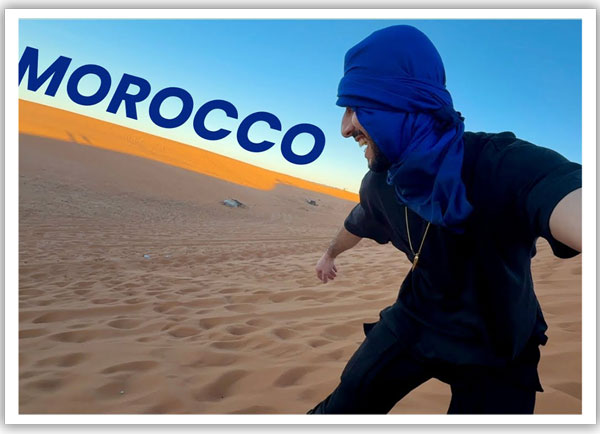
Whether you’re male or female, solo travel in Morocco is safe and rewarding if you remain alert and adapt to the cultural setting. The kindness and hospitality of many Moroccans more than make up for the occasional nuisance.
Areas That Are Generally Safe
Morocco offers a wide range of destinations that are not only beautiful and culturally rich but also safe and well-suited for solo travelers. Here are some of the best places where you can explore with peace of mind:
1. Marrakech
-
Why it’s safe: Heavily patrolled by tourist police; tourism is the city’s economic backbone.
-
What to watch for: Busy Jemaa el-Fnaa square can attract scammers and pickpockets.
-
Tip: Book a riad (traditional guesthouse) inside the medina with good reviews; they often offer airport pickup and reliable guidance.
-
Bonus Insight: Stick to well-lit streets at night and consider joining group tours for excursions to the Atlas Mountains or the desert.
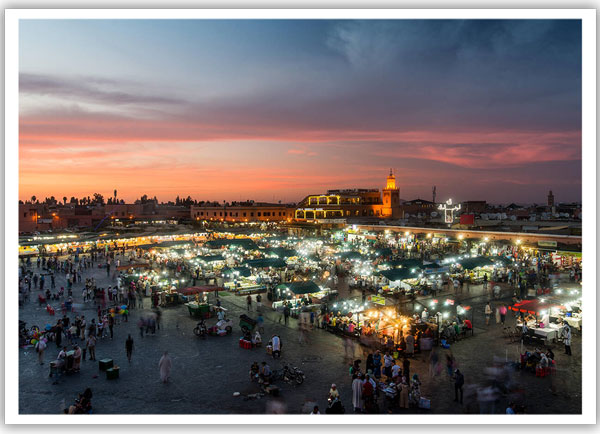
2. Fes
-
Why it’s safe: One of Morocco’s most historic cities with many cultural gems.
-
What to watch for: The Fes medina is enormous and easy to get lost in. “Guides” may offer help and demand tips later.
-
Tip: Use offline maps or hire an official guide through your riad.
-
Bonus Insight: Be cautious around tanneries locals might insist on giving you a tour and then ask for high tips. Always agree on prices first.
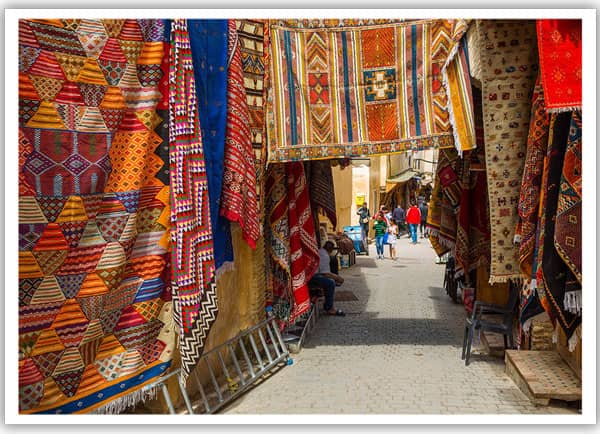
3. Chefchaouen
-
Why it’s safe: Known as one of the calmest, most peaceful cities in Morocco, Chefchaouen has a small-town feel with a strong sense of community. Crime rates are low, and the locals are welcoming, especially to tourists.
-
What to watch for: Some locals may casually offer hashish, as the region is known for its cannabis farms. These offers are usually harmless but should be declined politely.
-
Tip: It’s a perfect town for slow solo wandering and photography. The blue-painted streets of the medina offer a dreamy atmosphere. Mornings are the quietest great for taking photos.
-
Bonus Insight: Be sure to hike up to the Spanish Mosque for a panoramic sunset view over the city it’s a safe and popular walk for travelers.
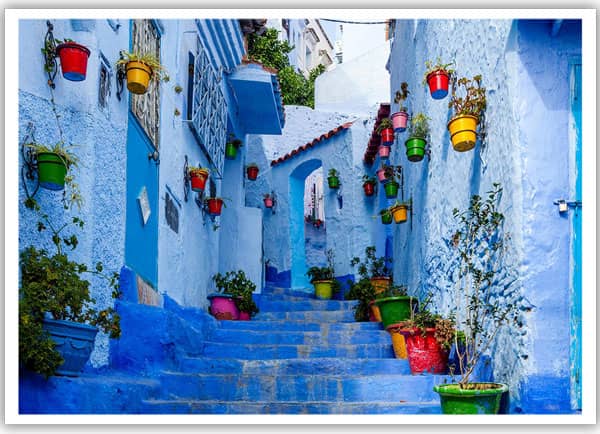
4. Essaouira
-
Why it’s safe: A laid-back coastal town with a relaxed vibe and far fewer hustlers than larger cities. Its compact medina, breezy seafront, and friendly people make it an ideal destination for solo travelers.
-
What to watch for: The wind can be intense (especially in summer), and on the beach, you might encounter people trying to sell camel rides or souvenirs a bit persistently.
-
Tip: Great for solo travelers looking for surf, seafood, and serenity. The fresh grilled fish at the harbor is a must-try.
-
Bonus Insight: Essaouira is a great place to try a surf lesson or simply relax by the sea with fewer crowds. Local art galleries and music festivals add to its charm.
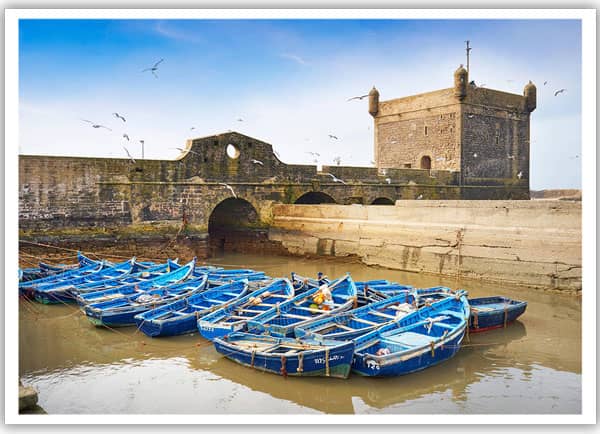
5. Rabat
-
Why it’s safe: Morocco’s capital is clean, organized, and known for being one of the most secure cities in the country. It has a strong police presence, well-maintained infrastructure, and a calm atmosphere. Rabat is home to many embassies and government institutions, which adds to its sense of order and safety.
-
What to watch for: Rabat has much less street hassle than Marrakech or Fes. While scams and hustling are rare, it’s still smart to remain aware in busy areas like the medina or train stations.
-
Tip: Ideal for those seeking modern comfort mixed with history. The city offers wide boulevards, quiet gardens, and impressive historical sites like the Kasbah of the Udayas and the Hassan Tower part of the UNESCO World Heritage-listed site of Rabat, Modern Capital and Historic City.
-
Bonus Insight: Use the modern tram system to get around easily. For a peaceful seaside walk, head to Rabat’s Corniche perfect for a solo evening stroll or people-watching.
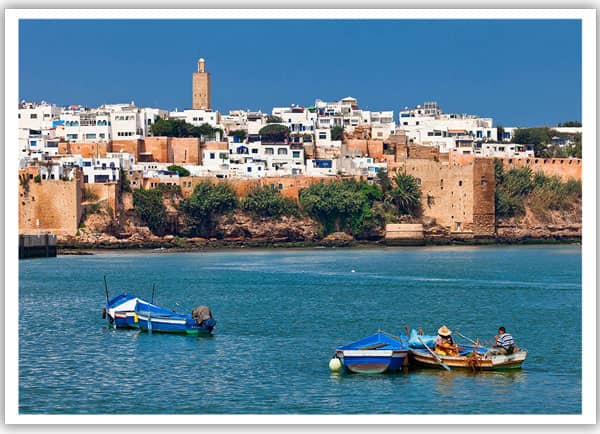
6. Agadir
-
Why it’s safe: A modern city rebuilt after a 1960 earthquake, Agadir is known for its beachfront resorts, well-planned layout, and relaxed vibe. Street harassment is minimal compared to other major cities, and the presence of tourists year-round keeps things secure.
-
What to watch for: While overall calm, you might encounter typical tourist traps, like overpriced souvenirs or overly enthusiastic vendors near the beach and marina.
-
Tip: Agadir is a great starting point if you’re heading south toward the Sahara or planning a coastal road trip. It’s also ideal for relaxing on the beach, trying Moroccan seafood, or enjoying spa treatments.
-
Bonus Insight: Don’t miss the panoramic view from the hilltop Agadir Oufella ruins, especially at sunset. For a peaceful retreat, visit the nearby Souss-Massa National Park.
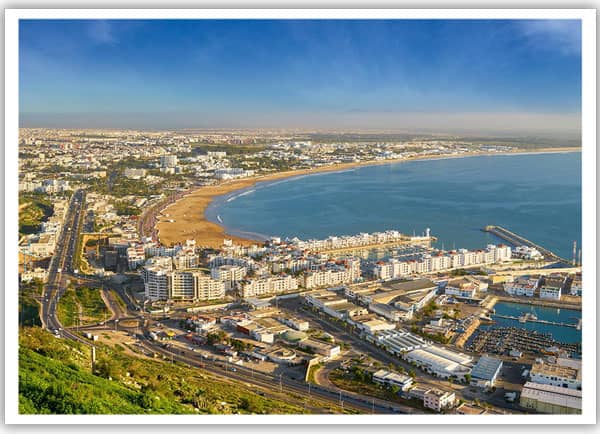
Common Scams and How to Avoid Them
While Morocco is filled with welcoming people, tourist scams are common, especially in major cities. Most scams are non-violent and revolve around pressuring tourists for money. Knowing what to expect can help you enjoy your trip without stress.
The “Helpful Local” or Fake Guide
- How it works: A friendly person offers to guide you through the medina or “show you a shortcut,” then demands money at the end.
- Avoid it: Always ask your riad or hotel to recommend a licensed guide. Politely decline unsolicited help: “La shukran” (No, thank you).
The “Closed Street” Lie
- How it works: Someone tells you the street or attraction you’re heading to is closed, then offers to take you elsewhere for a tip or to a shop.
- Avoid it: Keep walking. If unsure, ask a shopkeeper or use Google Maps.
Overpriced Taxis
- How it works: Taxi drivers refuse to turn on the meter and charge inflated prices.
- Avoid it: Insist on using the meter or agree on a price before entering. Use local ride apps like Heetch or Careem for transparent pricing.
Tea Shop or Carpet Store Trap
- How it works: You’re invited for “just tea” and end up in a high-pressure sales pitch for rugs or souvenirs.
- Avoid it: It’s fine to accept tea, but don’t feel obligated to buy anything. Say you’re not carrying cash or politely leave if pressured.
Pickpocketing in Crowds
- Where it happens: Bus/train stations, Jemaa el-Fnaa (Marrakech), or festivals.
- Avoid it: Keep your bag zipped and close to your body. Use a cross-body or anti-theft bag.
Quick Tips to Outsmart Scammers:
- Don’t look lost even if you are. Step aside and check your phone/map discreetly.
- Learn key phrases in Arabic or French to show awareness.
- Trust your instincts: if someone feels too pushy or overly helpful, walk away.
Transportation and Navigation Tips
Getting around Morocco as a solo traveler is relatively easy thanks to the country’s solid public transportation system. Still, there are a few things you should know to travel safely, avoid stress, and avoid getting ripped off.
Air Travel & National Airlines
For long distances especially between northern and southern cities flying can be a convenient and time-saving option.
- Royal Air Maroc (RAM): Morocco’s national airline. Reliable with good regional coverage.
- Air Arabia Maroc and Ryanair also operate domestic routes (e.g., from Casablanca to Agadir, or Tangier to Marrakech).
Pros:
- Fast and efficient for solo travelers covering a lot of ground.
- Major airports in Casablanca, Marrakech, Fes, Agadir, and Tangier.
Tips:
- Book domestic flights early prices can rise quickly, especially during holidays.
- Make sure to arrive early at airports, as internal flights still require check-in well before departure.
- Some smaller airports may have limited signage or English-speaking staff, so having your itinerary printed or saved offline is smart.
Trains – ONCF (National Railway)
- Pros: Safe, affordable, and comfortable for most routes (e.g., Casablanca to Marrakech, Rabat to Fes).
- Tip: Buy your ticket online (ONCF.ma) or directly at the station. Choose a first-class ticket for reserved seating and more space.
Buses – CTM and Supratours
- Pros: Reliable, air-conditioned, and popular among solo travelers for intercity travel.
- Tip: Book in advance during peak seasons. Avoid small, unlicensed bus operators that crowd around stations.
Petit Taxis (City Taxis)
- Where: Found in every city.
- Rules: Meant for city rides only. They should use a meter—but many don’t.
- Tip: Always ask the driver to use the meter (“compteur” in French) or agree on a price before you get in. In some cities like Fes and Marrakech, bargaining is the norm.
Grand Taxis (Shared Intercity Taxis)
- Where: Used for travel between towns or to rural areas.
- How it works: You share with others 6 people.
- Tip: Good for budget travel, but not the most comfortable or safest for solo travelers, especially at night.
Ride-Sharing Apps
- Best Options: Heetch (available in Casablanca, Rabat, Marrakech).
- Pros: Transparent pricing, no need to haggle.
- Tip: Install the app early and use Wi-Fi or a Moroccan SIM card.
Walking
- Pros: Best way to explore medinas and old towns.
- Cons: You can easily get lost in maze-like areas, especially in Fes.
- Tip: Download offline maps (e.g., Google Maps or Maps.me) and mark your riad or hotel location. Walk with purpose to avoid attention.
Avoid Night Buses if Traveling Solo
- While night buses are available and used by locals, some solo travelers find them uncomfortable or hard to navigate in the dark, especially when arriving in a new city at 2 a.m.
- Tip: Stick to daytime travel when possible or arrange trusted pickup in advance.
Having a general plan and knowing how to move around safely will save you time, money, and potential frustration. Most Moroccan cities are walkable and well connected just trust official providers and don’t hesitate to ask for help at your accommodation.
Cultural Sensitivity & Local Laws
One of the best ways to stay safe and enjoy your solo trip to Morocco is by respecting local customs and understanding the cultural norms. Morocco is a Muslim-majority country with conservative values, especially in rural areas. While it’s welcoming to tourists, being culturally aware will earn you respect and help you avoid misunderstandings.
Dress Modestly
- Why it matters: Locals tend to dress conservatively, and revealing clothes can attract unwanted attention, especially in smaller towns or traditional areas.
- Tip for Women: Covering shoulders, chest, and legs (below the knee) is appreciated. A loose scarf can help you blend in without needing to wear a hijab.
- Tip for Men: Avoid tank tops or short shorts outside beach areas.
Religion & Sacred Spaces
- Mosques: Non-Muslims are generally not allowed to enter mosques in Morocco, with a few exceptions like the Hassan II Mosque in Casablanca.
- Tip: Be respectful when taking photos near religious sites. Avoid loud conversation or inappropriate clothing near places of worship.
Photography Etiquette
- Always ask for permission before photographing people, especially in rural areas or when photographing women or children.
- In some markets or artisan areas, locals may ask for a small tip in exchange for a photo—this is normal and polite to honor if you take the picture.
Alcohol & Drugs
- Alcohol is legal but not part of mainstream public culture.
- Drugs are illegal, even if you’re offered hashish casually in some cities. Possession or use can lead to serious legal consequences.
Ramadan Awareness
If you travel during Ramadan, be aware that many locals fast from sunrise to sunset:
- Eating, drinking, or smoking in public during the day is considered disrespectful.
- Many restaurants may open only after sunset.
By respecting Moroccan traditions, you’ll not only keep yourself safe—you’ll also be received with more warmth and appreciation by locals.
Essential Safety Tips for Solo Travel in Morocco
Traveling solo in Morocco can be an incredible experience, but it’s important to stay mindful of your safety. Trust your instincts if something feels off, don’t hesitate to walk away. Staying connected is crucial, so consider getting a local SIM card or portable Wi-Fi device to help with navigation, communication, and emergencies. Avoid flashing valuables like expensive jewelry or electronics, and use secure bags to protect your belongings, especially in crowded areas. Always opt for official services: insist that taxis use meters or use trusted ride apps like Heetch, and book accommodations and tours through reputable platforms. Carry enough cash in Moroccan dirhams for everyday expenses but avoid withdrawing large sums at once; use ATMs inside banks for added security. Choose safe and well-reviewed lodgings and take advantage of social opportunities such as group dinners or tours to meet fellow travelers while maintaining your independence. Learning a few key phrases in Arabic or French can go a long way in communicating politely and effectively. Don’t forget to save emergency numbers like police and ambulance on your phone. Lastly, avoid walking alone in isolated or poorly lit areas after dark, and always respect local customs and dress modestly. With these simple precautions, you can confidently explore Morocco and enjoy a memorable, safe solo adventure.
Final Thoughts: Is Morocco Safe for Solo Travelers?
Yes, Morocco is generally safe for solo travelers, including women, if you stay alert, respect local customs, and make smart decisions. Like any travel destination, it comes with challenges language barriers, occasional scams, or cultural differences but with a bit of preparation, those are easily manageable.
Morocco is a country of contrasts: ancient medinas and modern cafés, Sahara dunes and Atlantic waves, bustling souks, and quiet mountain villages. It has a deep culture of hospitality, and many solo travelers find themselves welcomed, helped, and even invited in for tea by strangers.
If you:
- Stay in trusted accommodations,
- Use common sense in public spaces,
- Learn a few local phrases,
- And stay open to the unexpected…
you’re likely to have a safe, rich, and unforgettable solo travel experience.
So—pack light, stay curious, and trust yourself. Morocco is waiting.
